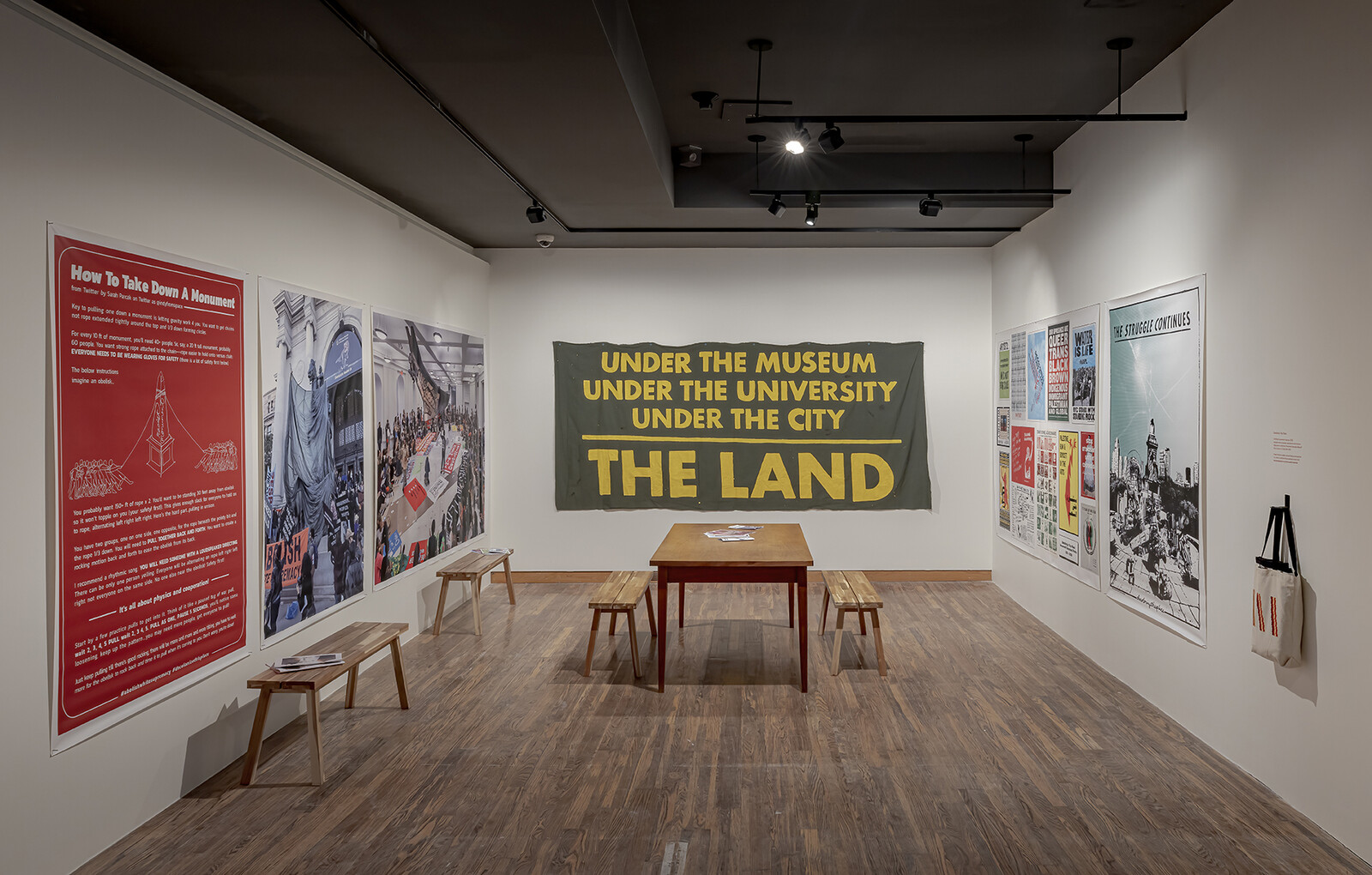Roundtable: March 30, 2022, 4pm
15 King’s College Circle
Toronto Ontario M5S 3H7
Canada
Hours: Tuesday–Saturday 12–5pm,
Wednesday 12–8pm
T +1 416 978 8398
artmuseum@utoronto.ca
The Art Museum and the Department of Art History at the University of Toronto present an artist roundtable that brings together Toronto- and New York-based artists and activists Decolonize This Place, Alan Michelson, and Susan Blight in a discussion about artist-led strategies for reclaiming suppressed histories and relations on stolen land. The panel will explore the overlap between art-making, public space intervention, and the archive, starting the conversation in the Haudenosaunee and Anishinaabe sovereignties in Tkaronto / Gichi Kiiwenging (Toronto), and drawing connections to the global context of colonialism.
Under the Museum, Under the University, Under the City: The Land is presented in conjunction with the Nations by Artists exhibition on view at the Art Museum until April 2, 2022.
Note: This roundtable takes place online and in-person. Watch the livestream on Art Museum’s YouTube channel; no registration is required. The in-person event will take place in University College, University of Toronto (15 King’s College Circle). Admission is free with registration. Register here.
About the speakers
Decolonize This Place (DTP) is an action-oriented collective based in New York City that uses cultural institutions as platforms to amplify the demands of decolonial social movements. Facilitated by MTL+, DTP consists of over 30 collaborators, grassroots groups, and art collectives that seek to resist, unsettle, and reclaim the city. Their contribution to the Nations by Artists exhibition is an in-gallery movement space with materials for study and action. For this conversation, we welcome five MTL+ facilitators: Amin Husain, Nitasha Dhillon, Amy Weng, Marz Saffore, and Crystal Hans. Decolonize This Place joins the roundtable as guests of the Department of Art History, University of Toronto.
Alan Michelson is an internationally recognized New York-based artist, curator, writer, lecturer, and Mohawk member of the Six Nations of the Grand River. His socially engaged, site-specific art practice is grounded in local contexts and informed by the retrieval of repressed histories. Sourcing from both Indigenous and western culture, he works across painting, sculpture, photography, sound, video, glass, and stone. His work Blanket Refusal in the Nations by Artists exhibition brings the spirit of the original treaties back into the frame of Haudenosaunee-settler relations and demonstrates the continuities between wampum and the written word.
Susan Blight (Anishinaabe, Couchiching First Nation) is an interdisciplinary artist working with public art, site-specific intervention, photography, film, and social practice. Her solo and collaborative work engages questions of personal and cultural identity and its relationship to space. As part of the The Ogimaa Mikana Project, she worked to restore Anishinaabemowin place-names to the streets, avenues, roads, paths, and trails of Gichi Kiiwenging (Toronto). For the Tree Protection Zone project on Hart House Commons, Blight made one of the construction hoardings into an experiment in public space intervention using biodegradable stickers and the Anishinaabemowin language. Blight is Delaney Chair in Indigenous Visual Culture at OCAD University and an Assistant Professor in the Faculty of Arts & Science.
Moderated by Nations by Artists co-curators Mikinaak Migwans and Sarah Robayo Sheridan.
About the Art Museum at the University of Toronto
The Art Museum is one of the largest gallery spaces for visual art exhibitions and programming in Toronto. The Art Museum originates and organizes an intensive year-round program of exhibitions and events that foster—at a local, regional, and international level—innovative research, interdisciplinary scholarship, and knowledge of art and its histories befitting Canada’s leading university and the country’s largest city.
Our supporters
The Art Museum at the University of Toronto gratefully acknowledges operating support from the Canada Council for the Arts, the Ontario Arts Council, and the Toronto Arts Council with additional project support from the Social Sciences and Humanities Research Council.



